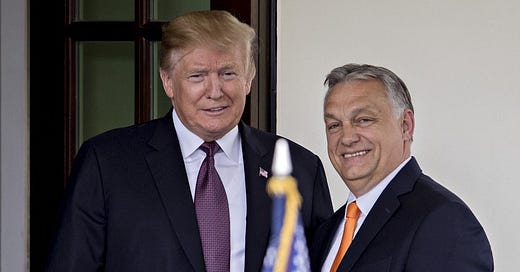Orbán’s Mar-a-Lago Meeting: The Kremlin’s Not So Quiet Influence in the U.S.
Hungarian Prime Minister Viktor Orbán, already infamous for his authoritarian grip on Hungary, made headlines this week with another visit to Trump’s Mar-a-Lago. Orbán didn’t just meet with Trump; he also had a cozy sit-down with Elon Musk, who’s conveniently playing the role of shadow president-elect these days—deepening his ties to some of the most powerful political figures in the U.S. All while JD Vance seems to be missing in action.
But Orbán didn’t stop there. Earlier today, after his recent meeting with Trump, he spoke for an hour with Putin about Ukraine. In his post-call message on X (formerly Twitter), Orbán described these as “the most dangerous weeks of the Russian-Ukrainian war.” He further stated, “We are taking every possible diplomatic step to argue in favor of a ceasefire and peace talks,” yet again exhibiting his ongoing push for Russia’s agenda in its genocidal war.
Trump's Ties to Europe's Far-Right: More of Russia's Influence
Meanwhile, the Guardian recently reported that on the night of the November 2024 U.S. election, a group of far-right German nationalists, including AfD candidate Philipp-Anders Rau, met with Donald Trump at Mar-a-Lago. Their meeting, which largely escaped media attention, underscores Trump's connections to European far-right factions, with the majority funded and supported by Russia.
The AfD, a party deeply investigated for its connections to the Kremlin—including the presence of Russian agents and financial backing from Moscow—aligns closely with Trump on key issues like nationalism and anti-migration policies. This further solidifies the disturbing convergence of far-right groups in Europe and the U.S., all of which are strengthened by Russian influence. Moscow has long sought to cultivate these alliances as part of a broader strategy to destabilize Western unity and subvert democracy.
Orban: A proxy of the Kremlin
Orbán, a long-time ally of Putin, has consistently opposed military aid to Ukraine since Russia’s full-scale 2022 invasion, pushing for peace talks that would freeze the war and solidify Moscow's control over illegally occupied territories. His diplomacy with Russia, even while Hungary held the rotating EU presidency, further exacerbated tensions within the EU, as Orbán worked to derail unified action against Russia—all while spying on EU officials.
Orbán's phone call with Putin, following his meeting with Trump and Musk, highlighted his role as a courier for Moscow's interests in the U.S. This visit comes after a prior July meeting between Orbán and Trump, where they discussed “the possibilities of peace” in Ukraine. For Orbán, “peace” has long meant backing Russia, which he has defended at every turn, even as Moscow continues its genocidal war in Ukraine. His diplomatic efforts have consistently aimed at undermining EU unity on sanctions against Russia and curtailing Western support for Ukraine’s fight for survival.
Orbán’s role extends beyond sabotaging aid and support for Ukraine; it involves actively enabling Russia’s broader strategy to destabilize Europe and the U.S., including election interference. An investigation, earlier this year, revealed the extent of Orbán’s complicity. In the 2020 Slovak elections, Hungary and Russia are believed to have worked together to keep the pro-Russian government in power. Orbán served as a middleman, facilitating Moscow’s influence in Slovakia while suppressing pro-democracy movements.
Orbán’s Far-Right Network: Heritage Foundation, CPAC, and Election Interference
Orbán’s U.S. strategy doesn’t end with personal meetings in Mar-a-Lago. His decade-long growing influence extends into American conservative circles, particularly through platforms like the Heritage Foundation and CPAC (Conservative Political Action Conference), where he has gained a foothold with key figures of the far-right. This is not just about aligning with populists; it’s about fostering deeper ties with U.S. conservatives who share his and Moscow’s disdain for democratic values and liberal governance.
Earlier this year, at a closed-door meeting at the Heritage Foundation, Orbán addressed a gathering of right-wing U.S. politicians, analysts, and influencers, further cementing his ties with far-right groups and pushing Russia’s agenda on Ukraine, including attempts to derail U.S. weapons and aid. Afterward, Orban met with Steve Bannon at the Hungarian embassy in Washington, DC. These connections underscore Russia’s strategy of leveraging cutouts to promote pro-Kremlin, anti-democratic ideologies across the West.
Orbán: A Chess Piece in Russia's Global Strategy to Subvert Democracy
Orbán is one of many figures cultivated by Russia over decades as part of its larger strategy to fund and exploit far-right movements across Europe and the U.S. The Kremlin's objectives are clear: to overthrow democratic systems, deepen societal divisions, and weaken the alliances that have underpinned global stability since World War II. Figures like Orbán, while not central to Moscow’s operations, serve as pivotal enablers in undermining democracy and promoting authoritarianism. For now, Russia’s primary focus seeks to leverage all its proxies—including Orbán, Trump, Musk, and others—to defeat Ukraine, plunder its land and resources, and dismantle Western resistance to its imperialistic expansionist goals.





